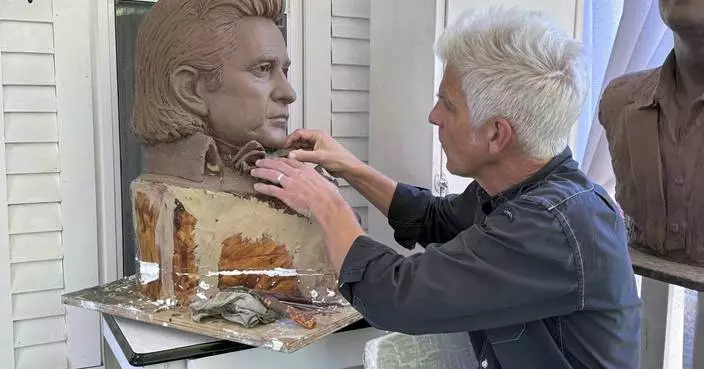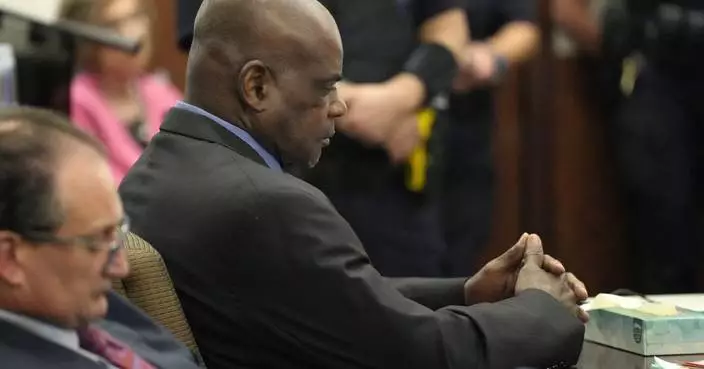NEW ORLEANS (AP) — A Texas county that wants to keep 17 books off its shelves — some dealing humorously with flatulence and others with issues including sex, gender identity and racism — argued its case Tuesday before 18 federal appeals court judges amid questions on whether the rights of the patrons or county officials were at risk.
Library patrons filed suit in 2022 against numerous officials with the Llano County library system and the county government after the books were removed. A federal district judge in Texas issued a preliminary injunction requiring that the books be returned in 2023. But the outlook became murkier when three judges of the 5th U.S. Circuit Court of Appeals split three ways on the issue in June — one saying all 17 books should stay on the shelves, another saying only eight had to stay, and another saying the court should leave it up to the county.
The upshot was that eight books were to be kept on the shelves. But the full court voted to toss that ruling and rehear the case. Tuesday's arguments were heard by the 17 full-time judges of the 5th Circuit, plus Jacques Wiener, a senior 5th Circuit judge with a reduced workload who was part of the original panel.
It is unclear when the full court will rule.
Judges closely questioned attorneys on both sides as attorneys supporting the county said government officials' decisions in curating a library's book selection amount to protected government speech.
“If private speech could be passed off as government by simply affixing a government seal of approval, government could silence the most powerful, unfavorable ideas,” Judge Leslie Southwick said. “It seems to me that there is a risk of that occurring here — that we are calling this particular activity, that occurred in this library, government speech, when in fact it is suppression of unpleasant, unacceptable ideas to some group of people.”
Judge Stuart Kyle Duncan was more sympathetic to the county, noting a litany of “weeding” guidelines libraries use in deciding which books to stock based on a variety of factors from the age and condition of the book to subject matter that could be considered outdated or racist.
He raised questions of whether a library could be allowed to remove an overtly racist book by former Ku Klux Klan leader David Duke or the children's book “The Cat in the Hat," which has been criticized for allegedly drawing on racist minstrel show culture.
“If a public librarian removes ‘The Cat in the Hat,’ has the public librarian violated the First Amendment?" Duncan asked.
“If the librarian removes ”the Cat in the Hat" because he or she is substantially motivated by suppressing the viewpoint in it, then yes," said Matthew Borden, attorney arguing for the library patrons.
The books at issue in the case include “Caste: The Origins of Our Discontent” by Isabel Wilkerson; “They Called Themselves the K.K.K: The Birth of an American Terrorist Group,” by Susan Campbell Bartoletti; “In the Night Kitchen” by Maurice Sendak; “It’s Perfectly Normal: Changing Bodies, Growing Up, Sex and Sexual Health” by Robie H. Harris; and “Being Jazz: My Life as a (Transgender) Teen” by Jazz Jennings.
Other titles include “Larry the Farting Leprechaun” by Jane Bexley and “My Butt is So Noisy!” by Dawn McMillan.
In June's panel ruling, Wiener, who was nominated to the 5th Circuit by former President George H. W. Bush, said the books were clearly removed at the behest of county officials who disagreed with the books’ messages.
Another panel member was Southwick, a nominee of former President George W. Bush, who agreed with Wiener — partially. He argued that some of the removals might stand a court test as the case progresses, noting that some of the books dealt more with “juvenile, flatulent humor” than weightier subjects.
“I do not find those books were removed on the basis of a dislike for the ideas within them when it has not been shown the books contain any ideas with which to disagree,” Southwick wrote.
Also on that panel was Duncan, a nominee of former President Donald Trump, who dissented fully. “The commission hanging in my office says ‘Judge,’ not ‘Librarian.’ ” Duncan wrote.

FILE - Michael McDavid and Emily Decker protest outside the Llano County Commissioner's Court meeting at the Llano County Law Enforcement Center in Llano, Texas, April 13, 2023. (Aaron E. Martinez/Austin American-Statesman via AP, File)
BONNE TERRE, Mo. (AP) — A Missouri man is scheduled to be executed by lethal injection Tuesday evening after the U.S. Supreme Court allowed the state to proceed with its plan to execute him, rejecting a last-ditch request to intervene on his behalf.
The justices rejected two separate appeals to spare Marcellus Williams’ life, over the objection of the three liberal justices a day after the Missouri Supreme Court and Republican Gov. Mike Parson declined to step in on Williams’ behalf.
Williams, 55, has long maintained innocence in the 1998 death of Lisha Gayle, a social worker and former newspaper reporter who was repeatedly stabbed during a burglary of her suburban St. Louis home. The execution is opposed both by Gayle's family and the prosecutor's office that put Williams on death row — an unprecedented combination.
“The family defines closure as Marcellus being allowed to live,” the clemency petition stated. “Marcellus’ execution is not necessary.”
Williams is among inmates in five states who are scheduled to be executed in the span of a week — an unusually high number that defies a yearslong decline in the use and support of the death penalty in the U.S. The first was carried out Friday in South Carolina. The others are scheduled to take place in Texas on Tuesday, and in Oklahoma and Alabama on Thursday.
Williams' hopes of having his sentence commuted to life in prison suffered dual setbacks Monday when, almost simultaneously, Republican Gov. Mike Parson denied clemency and the Missouri Supreme Court declined to grant a stay of execution.
Attorneys working on Williams’ behalf filed motions late Monday challenging the state Supreme Court’s decision.
“We have asked the U.S. Supreme Court to stay Marcellus Williams’ execution on Tuesday based on a revelation by the trial prosecutor that he removed at least one Black juror before trial based on his race,” Tricia Bushnell, an attorney for Mr. Williams, said in a news release.
The prosecutor in the 2001 murder case, Keith Larner, testified at an August hearing that he struck one potential Black juror partly because he looked too much like Williams — a statement which Williams’ attorneys asserted showed improper racial bias.
Bushnell said Larner removed six of seven Black prospective jurors. The jury ultimately had 11 white members and one Black member. Larner contended that the jury selection process was fair.
The Missouri attorney general's office filed a response Tuesday saying the only effect of a stay of execution would be another delay in a case “that has already been delayed many years through Williams’ litigation of meritless claims.”
The state Supreme Court, in a unanimous decision Monday afternoon, affirmed a lower court ruling rejecting Williams’ arguments.
Parson accused Williams’ attorneys of trying to “muddy the waters about DNA evidence” with claims that courts have repeatedly rejected.
“Nothing from the real facts of this case have led me to believe in Mr. Williams’ innocence,” Parson said in a statement.
Parson, a former sheriff, has never granted clemency in a death penalty case. Williams’ execution would be the third in Missouri this year and the 100th since the state resumed executions in 1989.
St. Louis County Prosecuting Attorney Wesley Bell has sought to set aside Williams’ sentence, citing questions about his guilt. His office joined lawyers from the Midwest Innocence Project in asking the U.S. Supreme Court to grant a stay.
“Even for those who disagree on the death penalty, when there is a shadow of a doubt of any defendant’s guilt, the irreversible punishment of execution should not be an option,” Bell said in a statement.
This marks the third time Williams has faced execution. He was less than a week away from lethal injection in January 2015 when the state Supreme Court called it off, allowing time for his attorneys to pursue additional DNA testing.
He was hours away from being executed in August 2017 when then-Gov. Eric Greitens, a Republican, granted a stay and appointed a panel of retired judges to examine the case. But that panel never reached a conclusion.
Questions about DNA evidence also led Bell to request a hearing challenging Williams’ guilt. But days before the Aug. 21 hearing, new testing showed that DNA on the knife belonged to members of the prosecutor’s office who handled it without gloves after the original crime lab tests.
Without DNA evidence pointing to any alternative suspect, Midwest Innocence Project attorneys reached a compromise with the prosecutor’s office: Williams would enter a new, no-contest plea to first-degree murder in exchange for a new sentence of life in prison without parole.
Judge Bruce Hilton signed off on the agreement, as did Gayle’s family. But at the urging of Missouri's Republican attorney general, Andrew Bailey, the state Supreme Court blocked the agreement and ordered Hilton to proceed with an evidentiary hearing, which took place Aug. 28.
Hilton ruled on Sept. 12 that the first-degree murder conviction and death sentence would stand, noting that Williams’ arguments all had been previously rejected. That decision was upheld Monday by the state Supreme Court.
Prosecutors at Williams’ original trial said he broke into Gayle’s home on Aug. 11, 1998, heard water running in the shower, and found a large butcher knife. Gayle, a former reporter for the St. Louis Post-Dispatch, was stabbed 43 times when she came downstairs. Her purse and her husband’s laptop computer were stolen.
Authorities said Williams stole a jacket to conceal blood on his shirt. Williams’ girlfriend asked him why he would wear a jacket on a hot day. The girlfriend said she later saw the purse and laptop in his car and that Williams sold the computer a day or two later.
Prosecutors also cited testimony from Henry Cole, who shared a cell with Williams in 1999 while Williams was jailed on unrelated charges. Cole told prosecutors Williams confessed to the killing and offered details about it.
Attorneys for Williams said that fingerprints, a bloody shoeprint, hair and other evidence at the crime scene didn’t match Williams.
AP writer Mark Sherman contributed from Washington. Salter reported from O’Fallon, Missouri.
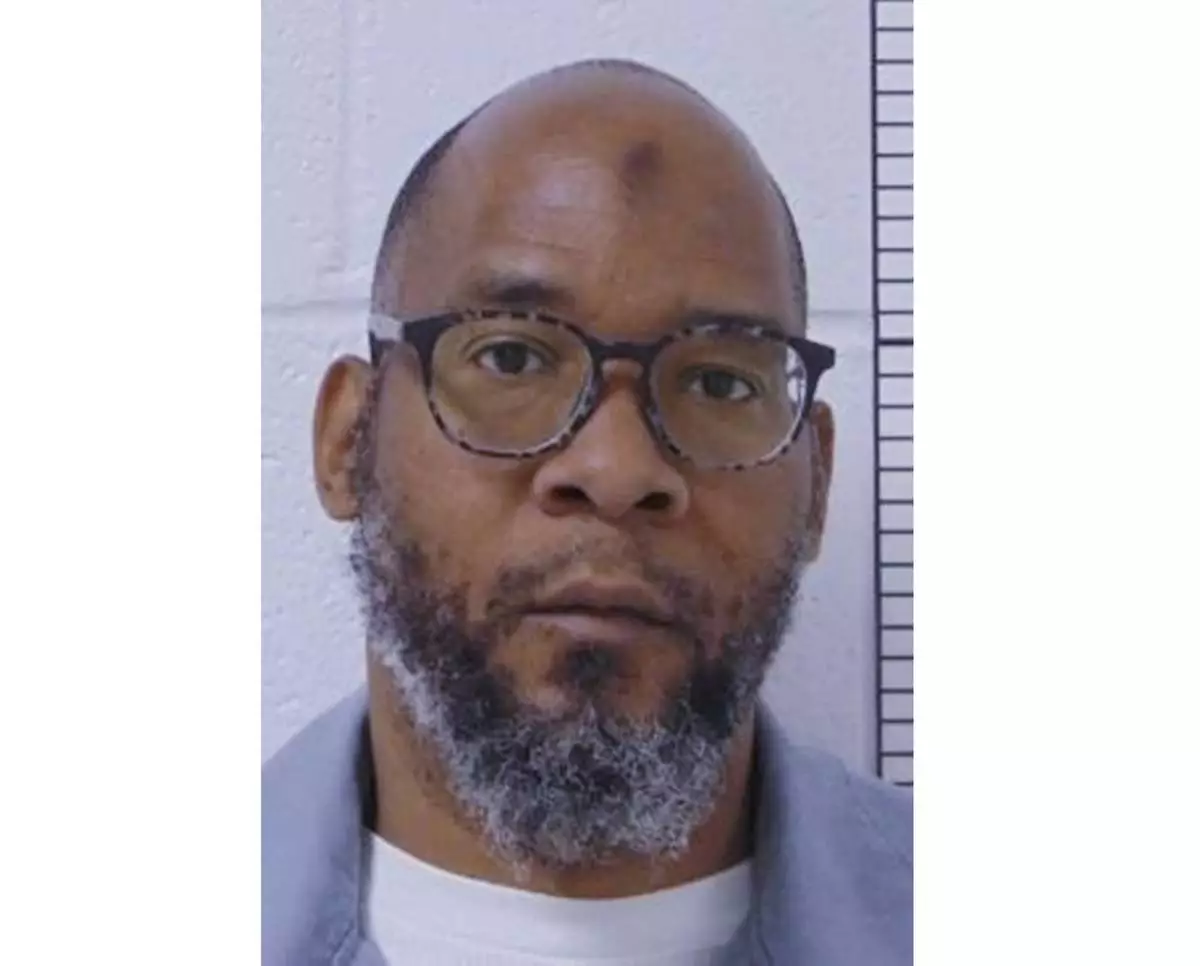
FILE - This photo provided by the Missouri Department of Corrections shows Marcellus Williams. (Missouri Department of Corrections via AP, file)
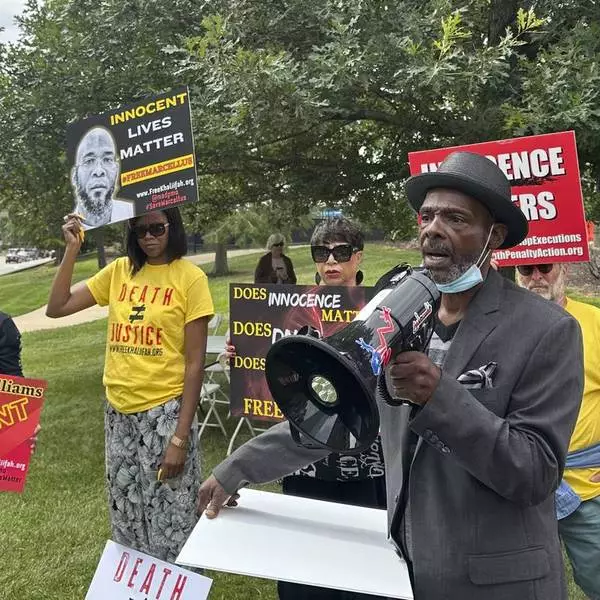
Lawyers seek Supreme Court intervention hours before a Missouri inmate's planned execution
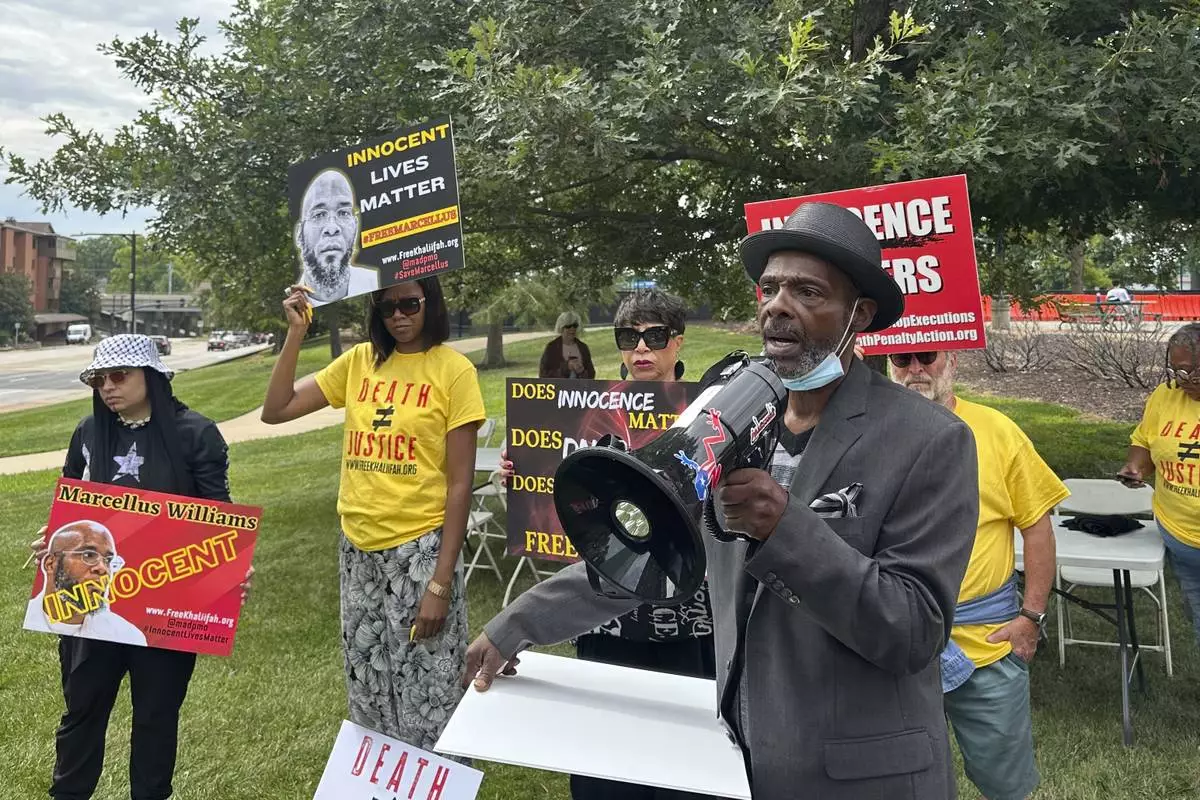
FILE - Joseph Amrine, who was exonerated two decades ago after spending years on death row, speaks at a rally to support Missouri death row inmates Marcellus Williams on Aug. 21, 2024, in Clayton, Mo. (AP Photo/Jim Salter, file)
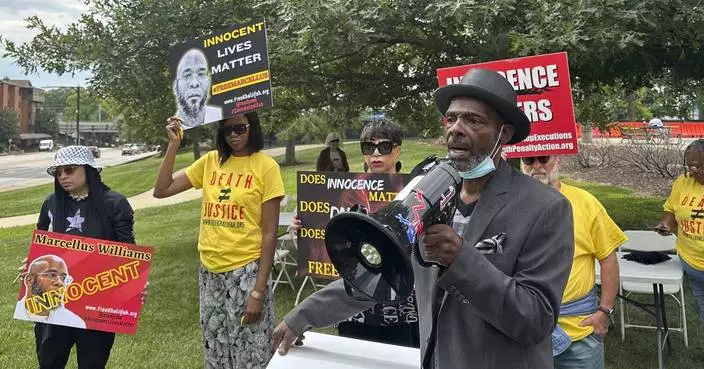
Lawyers seek Supreme Court intervention hours before a Missouri inmate's planned execution












